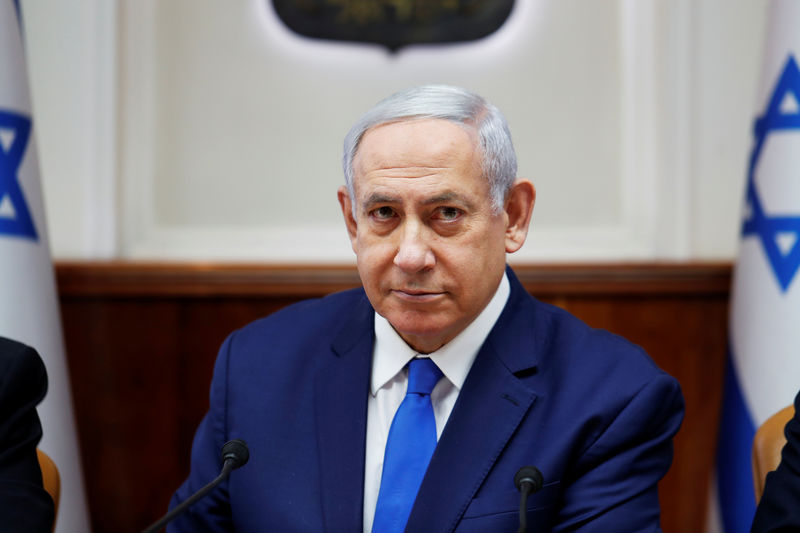JERUSALEM/DAMASCUS (Reuters) - Israel said on Sunday an air strike against an arm of Iran's Revolutionary Guards in Syria that it accused of planning "killer drone attacks" showed Tehran that its forces were vulnerable anywhere.
A senior Revolutionary Guards commander denied that Iranian targets had been hit late on Saturday and said its military "advisory centres have not been harmed", the semi-official ILNA news agency reported.
The Israeli military said its aircraft struck "Iranian Quds Force operatives and Shiite militias which were preparing to advance attack plans targeting sites in Israel from within Syria over the last number of days". The elite Quds Force is the overseas arm of Iran's Revolutionary Guards (IRGC).
Lieutenant-Colonel Jonathan Conricus, an Israeli military spokesman, told reporters "a number of attack drones", each armed with several kilogrammes of explosives, were to have been launched simultaneously at targets in northern Israel on Thursday but the plan was thwarted.
He did not disclose what measures Israel took that day. He described the "killer drones" - designed to slam into targets - as highly accurate. The military released grainy black-and-white surveillance footage purporting to show the Iranian operatives on Thursday near the drones' launching site.
In the footage, four people are seen walking in an open area, one of them carrying an object that the military identified as a killer drone.
Conricus said the drones, accompanied by the Iranian operatives, had arrived at Damascus airport from Iran several weeks ago and were taken to a Quds-controlled compound in a village southeast of the city.
Israel carried out Saturday's attack, Conricus said, after learning that another attempt to launch drones was imminent.
Writing on Twitter after Saturday's Israeli strike, Prime Minister Benjamin Netanyahu said: "Iran has no immunity anywhere. Our forces operate in every sector against the Iranian aggression. If someone rises up to kill you, kill him first."
Speaking on Sunday on the Syrian front, Netanyahu added: "Any country that allows its territory to be used for attacks against Israel will face the consequences, and I repeat, the country will face the consequences."
In a call with Netanyahu, U.S. Secretary of State Mike Pompeo expressed Washington's support for Israel's right to defend itself against threats posed by the IRGC, according to the State Department.
"The secretary and the prime minister discussed how Iran is leveraging its foothold in Syria to threaten Israel and its neighbours," State Department spokeswoman Morgan Ortagus said in a statement.
A war monitor said on Sunday that two members of Tehran-backed Lebanese militia Hezbollah and one Iranian were killed in the Israeli attack.
Hezbollah's leader Hassan Nasrallah said two Lebanese nationals were killed in the strike which he said targeted Hezbollah positions.
Syrian state media said Syrian air defences intercepted "hostile targets" over Damascus, the capital, on Saturday night. Witnesses in Damascus said they heard and saw explosions in the sky.
The Syrian army said in a statement that "the majority of the Israeli missiles were destroyed before reaching their targets."
Conricus, however, said the impact of the Israeli attack was significant. Israeli forces in the north, he said, were now on alert for any retaliation.
Israel says it has carried out hundreds of strikes in Syria against Iranian targets trying to establish a permanent military presence there and against advanced weapon shipments to Hezbollah.
Iran and Hezbollah are helping President Bashar al-Assad in the eight-year-old Syria war. Russia, which is also aiding Assad, has largely turned a blind eye to the Israeli air strikes. Netanyahu spoke to Russian President Vladimir Putin on Friday, the Israeli leader's office said.
Israel made no comment on what the Lebanese army and Hezbollah said was the crash of two Israeli drones in the Hezbollah-dominated southern suburbs of Beirut early on Sunday.
Hezbollah said one of the drones was rigged with explosives and caused some damage to the organisation's media centre. Nasrallah, threatened retaliation.
On Thursday, Netanyahu hinted at possible Israeli involvement in a series of blasts in the past few weeks that have hit weapon depots and bases belonging to paramilitary groups in Iraq, many of them backed by Iran.
On Wednesday, the PMF, the umbrella grouping of Iraq's mostly Shi'ite Muslim paramilitary groups, said the United States had allowed four Israeli drones to enter the region accompanying U.S. forces and carry out missions on Iraqi territory.
The U.S.-led coalition in Iraq dismissed the statement and the Pentagon denied it.

On the Israeli YNet news website, military affairs commentator Ron Ben-Yishai described the alleged Iranian killer drone attack plans as revenge by Tehran for the purported Israeli drone strikes in Iraq, noting that the two enemies were using similar weapons.